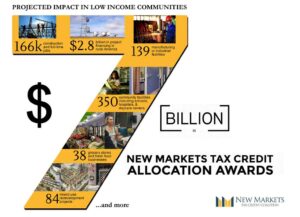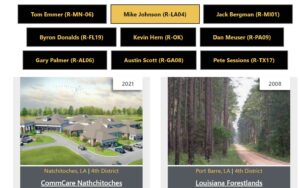Historic New Markets Tax Credit round will drive private-sector investment to communities left behind, growing businesses and creating jobs where they are needed most
WASHINGTON, D.C. – The U.S. Department of the Treasury Secretary Jack Lew announced the Calendar Year 2015 and 2016 New Markets Tax Credit (NMTC) allocation awards today at Educare DC, an NMTC-financed project providing early childhood educational programs in Northeast Washington, D.C. NMTC allocations were awarded to 120 Community Development Entities (CDEs) from around the country.
“The Coalition estimates that the latest round, based on analysis of more than 4,000 NMTC projects, will finance 844 businesses and revitalization projects and create some 166,000 jobs for people in communities left behind, adding to the NMTC’s long history of success,” said Bob Rapoza, spokesman for the NMTC Coalition. “In fact, the NMTC has generated more than $75 billion in total capital investment through public-private partnerships since the first credits were allocated in 2003.”

In April, Treasury announced it would combine the 2015 and 2016 rounds, for a total of $7 billion in NMTC allocations, allowing the 2016 and future award rounds to be announced in the year in which they are authorized. This action was made possible as a result of the PATH Act, which Congress passed in December 2015, providing for a five-year extension. The legislation provided the single largest and longest investment in the community development program’s history.
After this combined round, Treasury is authorized to make three additional allocations of $3.5 billion in 2017, 2018, and 2019. The $7 billion in NMTC allocation costs the federal government only $1.88 billion in foregone tax revenue, and thanks to the NMTC’s public-private partnership model, low-income communities will receive $14 billion in total capital, including $2.8 billion to rural areas. A key criterion of the program is that all applicants must provide a pipeline of projects that are ready to proceed should they receive NMTC financing. As a result of the low cost, the estimated cost per job for NMTC is less than $11,500.
Department of Treasury data shows 75 percent of NMTC activity is in severely distressed rural and urban communities with unemployment rates at least one and a half times the national average, poverty rates of at least 30 percent, or median incomes less than 60 percent of the area median income. Further, since its inception, the credit has led to more than 750,000 jobs. The credit is increasingly being used to bring manufacturing jobs back to America, with a record 30 percent of NMTC financed projects involving the financing of industrial facilities, waste recycling centers, and cutting-edge green-tech businesses in 2015. The credit is also used to finance health centers, child care and community facilities, schools, grocery stores and other businesses identified by communities and local leaders.
“As a result of the credit’s proven ability to create jobs and move the economic needle in the rural and urban areas where it’s been deployed, the NMTC has the support of a strongly bipartisan delegation in Congress,” adds Rapoza.
Congressional leaders also applauded the announcement of the 2015-2016 NMTC allocation awards:
“I was proud to lead efforts to secure a five-year extension of the NMTC in the PATH Act. I’ve seen the impressive results of the NMTC in Missouri, with 177 businesses receiving financing between 2003 and 2014, leveraging over $1.6 billion in total project investments. From the Save-a-Lot in Pagedale and Payit in Kansas City, to the rehabilitation of St. Louis Union Station—the NMTC is creating jobs and boosting local economies.” –Senator Roy Blunt (R-MO), who introduced New Markets Tax Credit Extension Act of 2015 (S. 591) on February 26, 2015, a bill which would make the NMTC permanent. Senator Blunt was the lead sponsor of a similar bill in the 113th Congress as well.
“The New Markets Tax Credit is a vital and cost-effective tool that is creating jobs, boosting opportunity and driving real growth across the country. I’m glad that Congress took the important step of providing a five-year authorization of the NMTC in the PATH Act, which was signed into law last year. I will continue to advocate for this program so that more communities can have access to the capital they need to unlock economic potential in their own backyards.” —Congressman Pat Tiberi (R-OH), who introduced New Markets Tax Credit Extension Act of 2015 (H.R. 855) in the House on February 10, 2015, which would make the NMTC permanent.
“We care about bringing quality, family sustaining jobs to our region and our nation. This is a commonsense bipartisan, initiative that will help revitalize communities and create needed jobs. It’s only right that we encourage private sector job growth for the sake of hardworking men and women everywhere. That’s why we are proud to work with Representatives Tiberi and Neal, and Senators Blunt, Schumer, Daines and Cardin to ensure the support this proposal deserves.”—Congressman Tom Reed (R-NY), an original and lead cosponsor of H.R. 855.
“In the past decade, the New Markets Tax Credit (NMTC) has generated billions in capital and created hundreds of thousands of jobs nationwide in economically distressed communities. In Massachusetts, this highly successful initiative has helped spur development from the Berkshires to Boston. As a longtime supporter of the tax credit, I welcome today’s announcement from the Treasury Department that an additional $7 billion will be invested in projects across the country thanks to the provision. It is another reminder just how effective the NMTC program has been.”—Congressman Richard E. Neal (D-MA), who is the lead Democratic cosponsor on H.R. 855.
To find out more about how the NMTC works in distressed urban neighborhoods and rural communities, watch this video on how the NMTC works in and for rural and urban communities. Contact Ayrianne Parks at 202-393-5225 or ayrianne@rapoza.org with press inquiries.





